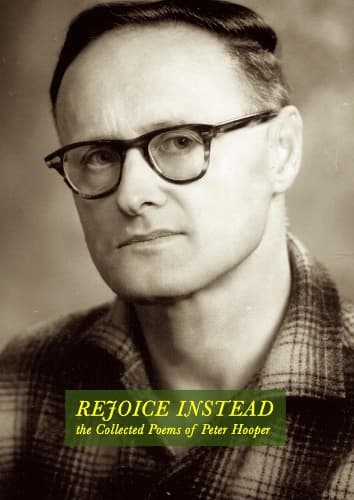Review: Rejoice Instead: the collected poems of Peter Hooper
Reviewed by Richard Reeve
There may well be no afterlife, no design nor point to anything. And yet there is a great mystery. For Westland poet Peter Hooper (1919-1991), the mystery, which he first learnt to look for as a young man immersed in the works of Thoreau, was a life-long creative preoccupation.
Inflected by a distinctly Buddhist outlook, his poems seek out the light and texture, narratives and ciphers of Westland, the poet in literary maturity having learnt widely from revered peers (Eliot, Snyder, the Cold Mountain hermits Han Shan and Shih Te, Brasch, Sargeson, Baxter, Dallas, Turner, Thoreau and Bachelard are authors mentioned by him) the creative legitimacy of serving no idea but the actual.
Even when occasionally they do not succeed, Hooper’s poems are typically interesting and at his best he is moving, intellectually and emotionally fulfilling, his images visceral, technically adept in his craft and humble, powerful and insightful in his voice. The earlier poet recurrently seems to aim à la Dylan Thomas and W. S. Graham for the “colour of saying,” interested less in the philosophical cogency of his metaphors than their attractiveness to the senses. Sometimes this experimentation throws up gems like Thoughts of Westland from London:
Swing heavy greenstone sea
the dark days now
deaf to the bellbird’s shout
once on a golden bough.
The influence of Thomas, Graham, Yeats, Eliot, Baxter and other lyric moderns here and elsewhere is clear enough. The older Hooper is paradoxically both more discursive and more imagistic, casting back to the Ancient Chinese poets of Cold Mountain and, too, to contemporaries like Williams, Olson and Ammons with their vivid, paratactic, narrative imagism. An example is Splinters, which begins “Things are themselves / except around the edges / life is what happens / in crevices” and ends:
Harsh and slow
the rasp of a heron
over the multi-syllabled
tribulations of the water.
Throughout this life-long poetic transformation are the poet’s settings, the Buller-Grey region most prominently, but also, in mid-life, Europe and Britain. Pat White’s helpful introduction recounts a tension felt by Hooper in moving back to his teaching job in Greymouth after a time overseas. No doubt, return risked being little more than a step back for the adventuring mind.
Yet return he did and as an older poet (indeed, as a Yeatsian / Cold Mountain / Caedmon-like self-proclaimed “Old Man,” sensitive to his own and others’ mortality), he embraced Westland’s idiosyncrasies, the vitality of growth (the bush of course, but also exotic phenomena like livestock or wild damson plums), intense sun, rain, the glowering seas, personalities: like Thoreau believing in his work inherently a purpose. Hooper’s internationalist outlook, widely evident in Rejoice Instead, seem to have powered his redoubling focus on place as a theme. He is parochial in the first sense of the word, “of his parish.”
A compilation of work from a number of independent publications by Hooper, as well as previously unpublished or uncollected work, Rejoice Instead is a beautiful, worthy and none-too-late publication, recording a solitary life lived with honourable dedication to the pursuit of poem-crafting.
The poems movingly traverse a wide array of human themes, including the death of family members and loved ones. Hooper’s semantic play is philosophically valuable; reading him, one has a distinct sense of the poet ever trusting in, indeed prepping, his subconscious to spill the right words for the poem at hand, aware that poetry requires quotidian attendance to the possibility of creative output, the poet arranging his rituals to give time to an exercise he in some oblique way believes to be intrinsically valuable. In the course of him looking for words, life, something is revealed to him.
I wish I had met Hedley Colwill “Peter” Hooper. He died on 3 April 1991, my 15th birthday.
Reviewed by Richard Reeve
